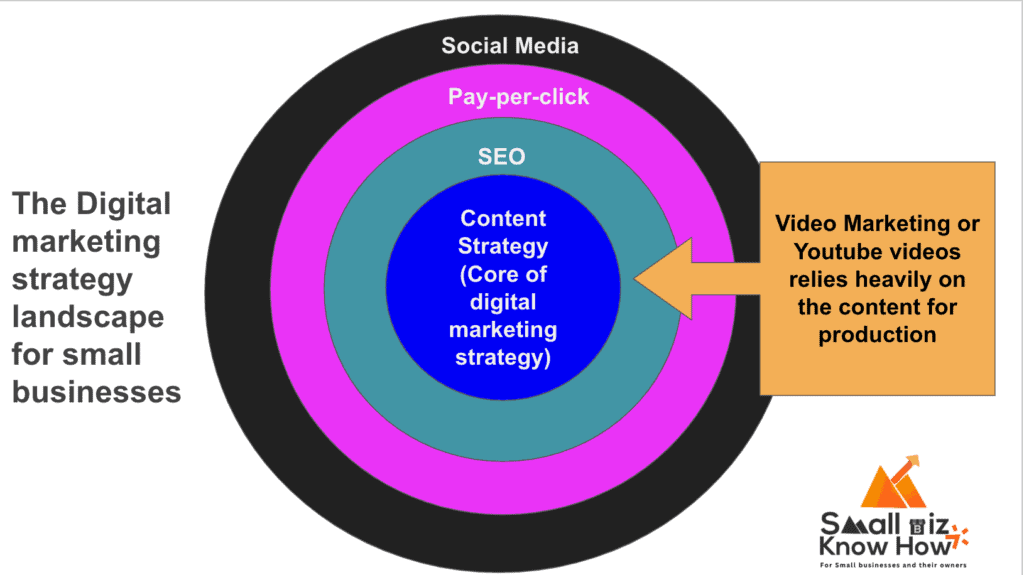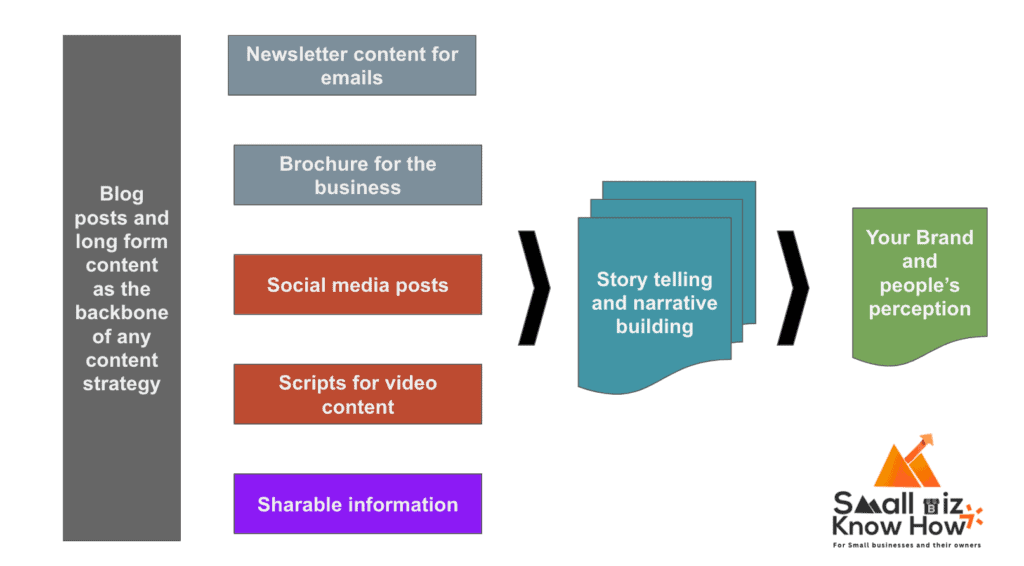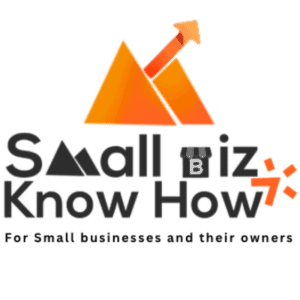As I have worked with many small business owners over the past several years, I found that one of the most misunderstood aspect of digital marketing is content marketing. The moment someone asks the business owner to look at adopting digital marketing practices, 9 out 10 business owners only talk about google ads, display ads and social media ads where they need to spend marketing money.
Business owners often refer to the creative designs and visual appeal of their promotions and ads as ‘content’ instead of the valuable long form information that they should be putting out. In order to shed some light into what is content marketing and how important content is for a small business, I decided to pen this article on the essentials of content marketing.
What is content marketing for small businesses?

Content marketing is the backbone of any digital marketing plan for a small business or any digital marketing strategy. The word ‘Content’ can be described as information that is given to potential customers, about your business. Content refers to the long form textual information that is usually found in a blog that businesses put up on their website.
In the days of the past, if a person wanted to sell an ‘idea’ they usually wrote a scientific paper or a book to communicate that idea. In a similar manner, in today’s age where you want to sell a product or a service, as a business, its imperative for you to write good quality content that provides good information.
Content marketing is a strategic long term approach that seeks to establish a mutually beneficial relationship with a potential customer. The essence of this approach is two fold, good content gets you online discovery on search engines. Good content also educates the customer about the virtues of your business, making them more likely to become paying customers.
Content marketing is the base of any small business SEO strategy or a paid ad strategy for a small business. Without a good content marketing strategy that is put on paper, a small business is likely to see limited success in their marketing efforts. Though the word ‘blog’ seems old, its is exactly what drives a lot of organic customers to the business.
Why is content marketing a critical component of marketing strategy for small businesses?

There are some important benefits that only content marketing can give a small business. All other forms of paid marketing can build awareness or gain an audience temporarily, but content is the way to go for any business with a long term plan to grow their business and to grow their audience who can potentially become new customers.
Some of the factors that make it critical for any small business to take content and blog seriously and have a content strategy in place as a part of their marketing strategy is as follows
- Content is a low cost approach to digital marketing – The key investment here is time, you need to invest time in creating good quality, helpful and information content for your target users consistently. This help attract the right audience.
- Content is necessary to build trust and authority – For any search engine, to show your business on top the search engine results page, your website needs to have an ‘authority’ on the subject. This can only be built over time as you write more information about the subject. Authority helps convert audience into paid customers over time.
- The quality of content says a lot about your brand – The more you create helpful and educational content about your brand, the more potential customers are likely to trust your brand. This results in better engagement with the audience you are targeting.
- Content creates a long-term relationship with your audience – The more people like what you write on your blog, the more they keep coming back for more and higher chances that they will become your customers
- Content marketing through a blog is the only effective and scalable way to create organic free leads over the long term, this increases the audience and customers the business earns over time
- Content marketing improves user engagement – The more your audience consume your content you create on your blog, the more likely they are to come back to check out all new content which drives up engagement with your business which increases overall awareness of your brand
With all these benefits of content marketing outlined for your business, its imperative that you have a robust content strategy in place that aligns well into the overall marketing plan for your small business. It is essential to take your blog seriously to build an audience that can eventually convert into customers.
How does content fit into an overall marketing plan?

At the risk of sounding repetitive, Content marketing should be the bedrock of any marketing plan. Any marketeer worth his or her salt, will not have a marketing strategy that does not include a content plan.
Again, at the risk of sounding repetitive, ‘content’ refers to informational articles, that answers specific customer questions or provides solutions to customer problems. These are usually written pieces (much like this one) with over 1000 words, along with good infographics to educate the user and keep them engaged.
The following ways are how content marketing fits into the overall marketing plan for a small business
- Building the foundation for digital presence – As i said earlier, content forms the foundation of any digital marketing strategy
- Boosts online discoverability by supporting SEO efforts – SEO needs something to work on for it to be able to deliver good results. Good quality content is the perfect input that SEO can use to improve online discovery for small businesses
- Supports Social media marketing – All the informational content you produce, can be condensed and teased through all social media channels for your business. Its also forms the guard rails to guide any social media strategy for your business. However, social media is not the backbone of any content strategy to get new customers and build an audience.
- Lead Generation for free – Content is the only strategy within digital marketing that provides your business with a long term supply of good quality free inbound leads
- Supporting other marketing efforts – All other promotions, pay-per-click advertising or affiliate marketing can lean on the content to keep audience engaged
- Defines the customer journey – Content aligns with the thought process of potential customers since its expected to answer all their questions. This ends up defining the customer journey since the content walks the customer through the buying journey
Essentially, while making any marketing strategy for a business, the content strategy must be laid out at the beginning and then the marketing strategy developed around it for all other channels that support it.
What is quality content? How does content affect a brand?

Now that we have established what content marketing is and how it fits into any digital marketing strategy, lets look at what makes for quality content.
Simply put, good quality content is something that is original, adds value to the reader’s life and is written by someone who knows what they are talking about.
There are some specific questions you can ask yourself to evaluate if you have produced good content
- Does the content add anything new or original to the audience?
- Does it address the questions the readers have completely ?
- Does tha person producing the content know anything about what he or she is talking about?
- Does it have some engaging or entertainment factor or is it dry and boring to read?
- Are a lot of engaging visuals or videos used to augment it?
If you have a degree of confidence that your content has the above parameters, you should be able to say that you have produced quality content. In addition to this, if you search for “google quality rater guideline” you will know how content is evaluated by google to distinguish between good and bad quality.
Now quality content is extremely important for a brand
Imaging that you are looking for for guidance on DIY installation of a heat pump before the winter. You want instructions from an expert with good illustrations that cover all possible mistakes along with prevention measures so that. This ensures that you do a good job out of it.
If you come across a mediocre guide from a brand that does not address everything comprehensively, will you even consider purchasing any of that brand’s products in future? I don’t think so.
So, any content that you put out, you must keep in mind that anyone who reads it is a potential customer and bad content can turn them away forever.
What are the types of content that small businesses should know about?

There are many types of content that a small business needs to produce that fits into an overall marketing strategy of the business. As i said earlier, before you finalise and sign off on a marketing strategy and allocate a budget, make sure that all of it is based on a sound content plan for the business.
There are multiple types of content that a business will rely on, some of the most important ones for a small business are
Blog Posts and other long form of content such as email marketing
Blogs, email marketing and other written long form content are the fundamental components of any content strategy within digital marketing. These are published on the business website and the primary purpose is to educate and engage with readers who may be potential customers of the brand.
Blogs typically have a conversational and personal tone to keep the readers engaged and connected with the brand. Blog content is structured typically with a target audience in mind and work very closely with SEO to ensure that the business can derive the maximum benefit from organic search.
Email marketing along with blog posts when combined have a great lead generation and user engagement potential. Email marketing is often an underused format in content marketing in this day and age where everyone is turning to tik tok. When long form, relevant content is served to potential customers via email marketing, it builds brand awareness and trust in what you do more than quirky videos which are a few seconds long.
Email marketing should be leveraged to keep users engaged and to drive repeat traffic to your website.
User Generated content

When your target audience really enjoys the content you put out, they are tempted to leave comments or reviews for your product or service. These comments, reviews, feedback etc. that are visible publicly are what are treated as user generated content or UGC. I would also include customer testimonials into user generated content.
The benefit of this type of content is that it builds social proof for your business and adds to the authenticity. A mixture of good and bad reviews will give potential customer a true representation of your business.
It will also give you feedback as a business owner on what you need to improve.
Influencer marketing content
This is not the content that you create, but you lean on to other content creators who are influencers in a specific niche. They are usually video creators, podcasters or other writers who have significant following in the respective sectors.
As a business owner, you can tap into an influencer’s target audience if there is a great degree of commonality with your target audience. This however involves sponsoring something for the influencer in order to get the content out and generate traffic for you.
Typically the content marketing from this type of channel happens mostly on social media where the audience frequently engage. Having a social media presence and communicating there as a part of your content marketing initiatives will often boost the effect of an influencer’s content.
Video Content
When you make videos and put it up on youtube, its video content. Thats it.
Make sure that this is entertaining or educative and adds value to your prospective users. Making videos and embedding them into your blog posts is another way to get people to engage with you.
Other forms of marketing content that are usually used by small businesses

There are many types of content that are not mainstream, but will be useful for small businesses to consider as a part of their overall content plan.
- Podcasts or audio content – its a great format for educating potential customers, but not so great from a discovery perspective
- Using meme or humour – self deprecating humour never goes out of style, catch tha attention of existing customers through these when sent via emails or whatsapp
- Digital brochures which are interactive can boost curiosity about your brand
- Personalised videos to thank customers
Some of these may not find their way into mainstream marketing campaigns, but as a small business, you have a lot more flexibility in deciding how to use such content.
How can all these forms of content be used by small businesses to create a coherent content strategy?

Long form content works as the backbone for all other content strategies. All other content use inspiration of various angles available in the long form content. These channels work to amplify the existing content to work together to create a narrative about your brand and tell stories to potential customers.
Story telling that is tightly woven around the main content direction will maintain consistency in communication and will amplify the single message you want your customers to take from your brand.
What things should small businesses keep in mind so that any content strategy is aligned with marketing strategy?
There are critical things a small business must keep in mind while developing a content and marketing strategy.
- Target audience – define as precisely as possible, who is your target audience and who your target customer is
- Marketing objectives and content objectives – have clear measurable outcomes so that you know what you are aiming for
- Consistency in content frequency – have a content calendar in place and a defined frequency to publish. Stick to the plan.
- Repurpose existing content – look at ways to get multiple objectives with the same content that is available to you. Max out the RoI from each piece.
- Balance evergreen, informational and seasonal content – dont over-index only on seasonal content since those have a short shelf life and its difficult to repurpose them over time
What should be the goals of content marketing?
Many business owners have a content plan for just the sake of it and think of it from a very short term horizon. There are some clear goals you must set for yourself which a good content plan can deliver over time. Important long terms goals to fullfil using your content marketing strategy are
- Organic Traffic to your website – This must increase over time
- Building authority in your business sector – your brand should be in consideration among your target audience
- Drive thought leadership – your business should deliver useful and original information
- Build trust with you target audience
- Generate good quality, high intent sales leads over time
Once you set these goals and start tracking them, you will the benefits of content marketing come through. Do not settle for things like social media likes and shares, its not going to really have an impact on your business revenue or profits.
A good content marketing for small business example
Good content marketing for small business case study: River Pools and Spas

An example of effective content marketing by a small business is “River Pools and Spas,” a small pool installation company in Virginia, United states. Their approach shows how a small business can use content marketing to achieve significant growth.
Strategy and Execution:
- Educational Blog Content: Recognizing that potential pool buyers had many questions and there was a lack of comprehensive information online, River Pools started an educational blog. They focused on writing in-depth articles answering common questions about pool installation, maintenance, costs, and comparisons of different types of pools.
- ‘They Ask, You Answer’ Philosophy: The company adopted a content strategy famously known as “They Ask, You Answer,” coined by Marcus Sheridan, one of the owners. They committed to honestly and thoroughly answering any questions their potential customers might have. This was a great “user generated content” strategy.
- Search Engine Optimization (SEO): By focusing on questions that real customers were asking and using relevant keywords, their blog posts started ranking highly in search engine results, drawing in significant organic traffic for free of cost
- Use of Various Content Formats: Apart from blogging, they also utilized other content forms like eBooks, videos, and infographics to provide information. Notably, their video “How Fiberglass Pools Are Made” became very popular, further establishing their expertise. See that they converted a detailed blog post on the same topic to a video.
- Lead Generation: The valuable content offered on their blog and website wasn’t just educational; it also served as a lead generation tool. They used calls-to-action and offered downloadable resources in exchange for contact information.
Results:
- Increased Web Traffic: Their website became one of the most trafficked pool websites in the world, attracting a vast audience looking for information about pools.
- Boost in Sales: The increased traffic and lead generation contributed to a significant rise in sales. They continue to see growth due to their strong online presence.
- Brand Authority: River Pools established themselves as an authority in the pool industry, not just locally but nationally. Their content has become a go-to resource for anyone considering a pool.
- Expansion of Business: The success of their content marketing strategy has allowed them to expand their business significantly, branching out into manufacturing fiberglass pools and becoming a major player in the industry.
Key Takeaways:
River Pools and Spas’ content marketing success demonstrates how a small business can effectively use content to drive traffic, generate leads, build authority, and significantly grow their business. Their focus on addressing customer questions, creating valuable content, and leveraging SEO, combined with consistency and honesty in their messaging, were key to their success.
Small business content marketing mistakes that can stall business growth

The last section i want to cover is about the most common but impactful mistakes that small business owners make too often that does not give them enough return for the time and money they invest in content marketing.
Not having a content plan and content strategy in place
Having a content plan on paper is the number one thing that a business owner needs to take care of. A mediocre plan, that is executed well, is much better than a great plan that is executed poorly. To drive execution, a small business owner must have the content plan on paper and communicate it to everyone involved.
This will become a guiding document for the business to go back to and it will be easy to compare what did not go as per plan.
Outsourcing content from the beginning
In the beginning, you as a small business owner must put in the time and effort to write content for your business. This is the only way in which the passion that you have will come through and reflect in the content.
It becomes much easier to address the content to your target customer since you as the business owner will have a much better pulse on who your target customer is. Outsourcing to a third party writer saves time, but more often than not, you will find the content not relevant at all to your target audience
All the nuances and your personal learning will add a rich flavour to the content that no content writer can ever produce.
Not having an understanding of what content is relevant for your business
In the introduction paragraph, I wrote about how small business owners think about content as “flashy visuals”. This is where the right foundation comes in. You have seen the types of content that are relevant for any small business.
Always start with long form educational content. That will give you a solid foundation, that is evergreen from which you can build other content and share it on social media.
It is much easier to create visually appealing graphics than it is to write a 2000 word article that addresses a customer’s pain point. Do the hard thing first!
Not being consistent when it comes to posting content
Since its not the easiest to bring out lengthy informational articles. Due to sheer effort and work involved, many business owners tire out after putting out the initial pieces of content.
This is where a content calendar comes in. Make a calendar of what you will put out and when you will do it. Stick to the plan.
I hope that this article has given some insights into what content marketing really is and what small business owners should really do about it.
